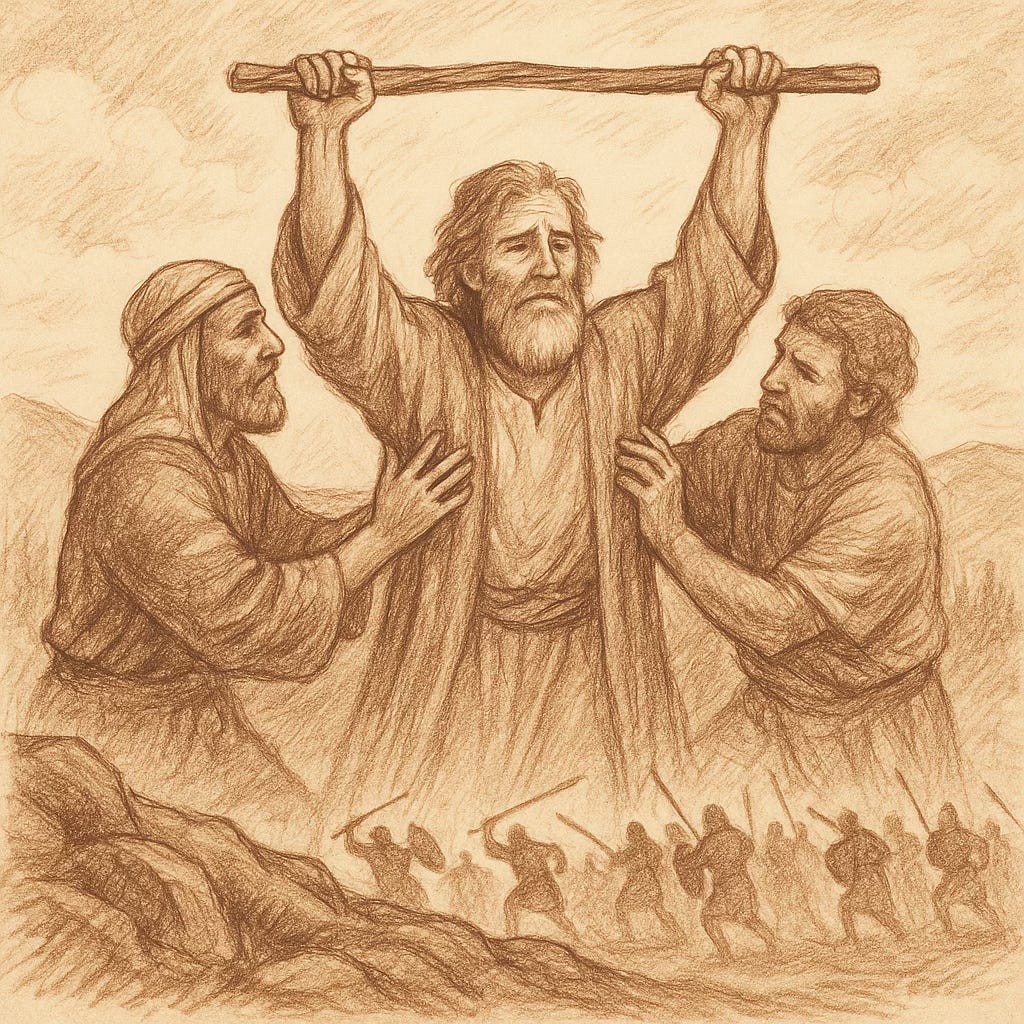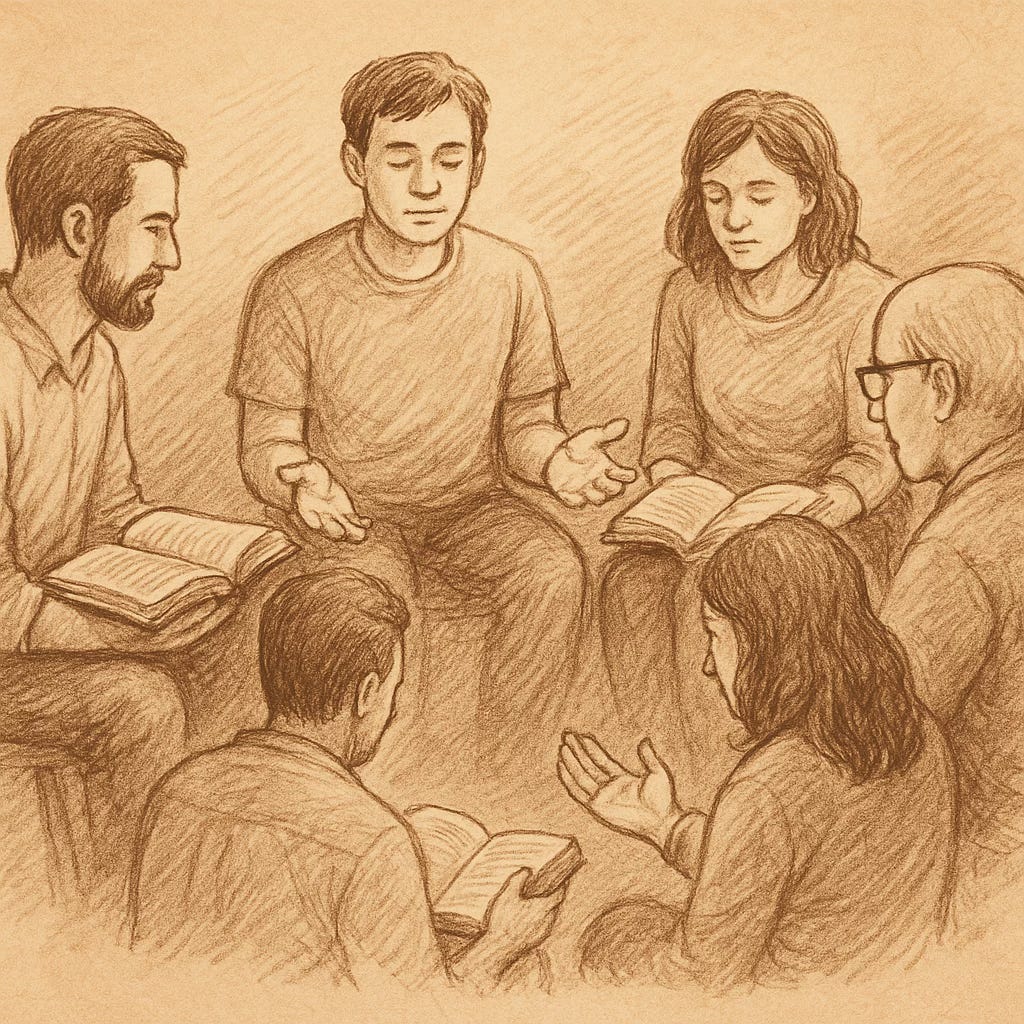Christ and the Crushed: The Church as a Refuge
Equipping the Church to Care for the Crushed with Christ’s Compassion

Part 4 of 4 | Christ and the Crushed: A Biblical Response to Trauma
Introduction: A People of Peace for the Crushed in Spirit
In Part 1, we named the weight of trauma and introduced the biblical vocabulary for pain—words like sorrow, affliction, and anguish that give voice to the crushed soul. Scripture doesn’t sanitize suffering; it speaks to it with holy honesty and enduring hope.
In Part 2, we journeyed inward, recognizing that trauma is not just something that happens to us—it’s something we process through the heart, the core of our inner life. We saw that true healing does not begin with behavior change but with heart renewal. The gospel reaches far deeper than management—it transforms the soul.
In Part 3, we evaluated trauma-informed care and offered a biblical alternative. While the world offers empathy, identity labels, and symptom management, we saw that only Christ offers redemption, restoration, and a renewed identity. We were reminded that truth and grace are not just therapeutic—they are incarnational.
Now, in this final article, we turn our eyes to the place where hope should be most visible: the local church. If Christ is the Healer, then His Body must be the hands that bind wounds and the voice that gently speaks peace. The church is not just a classroom for the informed—it is a refuge for the broken, a hospital for the wounded, and a family for the isolated. This is where the crushed should encounter not mere comfort, but Christ. And He has called His people to be His instruments of healing, bearing one another’s burdens and pointing the wounded toward eternal hope.
The Role of the Local Church and Discipleship
The church is not peripheral to trauma care—it’s central. In a world where hurt often hides in plain sight, the body of Christ must be a refuge, not a bystander. The people of God, armed with the Word of God, are Christ’s hands and feet to the crushed, the confused, and the weary. Sadly, many churches have surrendered their shepherding role to silence or outsourced it to secular models—when they’ve actually been commissioned to be sanctuaries of healing, hope, and holy restoration.
But Scripture paints a better vision—a vision where the local church becomes the very place where brokenness meets redemption, and wounded pilgrims find strength to stand again.
A Culture of Grace and Patience
Trauma recovery is not a sprint—it’s a long, winding road filled with setbacks, sorrows, and sanctifying steps. The local church must embody the gospel by cultivating a culture marked by grace, patience, and biblically grounded compassion.
“As for the one who is weak in faith, welcome him, but not to quarrel over opinions.” – Romans 14:1
“We who are strong have an obligation to bear with the failings of the weak, and not to please ourselves.” – Romans 15:1
Trauma often leaves sufferers disoriented, anxious, guarded, or even erratic in their responses. In these moments, the church must not scold or dismiss. It must not tell the hurting to simply “try harder” or “have more faith.” That’s not biblical compassion—it’s spiritual negligence. True gospel care doesn’t wave off suffering with pious platitudes; it steps in, gets low, and holds up the weary arms of the afflicted, like Aaron and Hur held up Moses’ arms as the battle raged (Exodus 17:12). They didn’t tell Moses to “just believe more”—they bore his burden with him so that victory could be secured.

Biblical trauma care is not about diminishing pain or demanding performance. It’s about rallying around those who suffer so they can see themselves not as victims, but as victors in Christ—blood-bought children of a compassionate God who redeems even the darkest valleys.
One-Another Care: The Soul’s Safety Net

Healing doesn’t only happen in the counselor’s office—it unfolds in the sacred rhythm of ordinary, faithful relationships. The church’s “one-another” commands were never meant to be optional—they were meant to be life-giving anchors for those tossed by the waves of suffering.
“Bear one another’s burdens, and so fulfill the law of Christ.” – Galatians 6:2
“Admonish the idle, encourage the fainthearted, help the weak, be patient with them all.” – 1 Thessalonians 5:14
Trauma isolates. It whispers lies that say, “No one understands,” or “You’ll never be whole again.” But gospel community dismantles those lies. It surrounds the hurting with people who don’t just listen—they carry, they pray, they persevere. And when everyday saints lean into this calling, the church becomes a net that catches the falling soul.
A Hospital, Not a Classroom
The church must never confuse theological knowledge with soul care. Biblical depth matters—but truth without love can crush already-burdened hearts.
“He heals the brokenhearted and binds up their wounds.” – Psalm 147:3
“Let each of us please his neighbor for his good, to build him up.” – Romans 15:2
The church must be more than a lecture hall—it must be a field hospital. Yes, we must teach the Word. But we must also apply it tenderly, personally, and persistently. The wounded need more than doctrine—they need discipleship wrapped in compassion. In a gospel-saturated church, healing doesn’t come through sterile programs but through sincere, sacrificial presence.
Equipping Everyday Saints with Extraordinary Truth
Biblical trauma care is not a specialized ministry for the few. It’s a gospel calling for the many. The goal is not to produce experts—but ambassadors (2 Corinthians 5:20).
“All Scripture is breathed out by God and profitable for teaching, for reproof, for correction, and for training in righteousness.” – 2 Timothy 3:16
When believers see that the Bible is not just sufficient for salvation but also sufficient for soul restoration, a quiet confidence begins to grow. Laypeople—parents, elders, small group leaders, youth workers, and greeters—begin to see trauma not as something to avoid or refer out, but as an opportunity to reflect Christ’s comfort. And when the church rises up with Bibles open and hearts soft, the wounded don't just survive—they begin to sing again.
Conclusion: From Brokenness to Beauty in Christ
Trauma is real—its wounds are deep, its effects are lasting, and its voice can feel louder than truth. But louder still is the voice of Christ, the One who binds up the brokenhearted and speaks peace to the storm within. In a world that offers shallow solutions and hollow labels, the gospel offers something radically different: resurrection.
Yes, our culture will continue to hand out diagnoses, define people by dysfunction, and offer techniques that numb but never truly heal. It may give language to describe pain—but only Christ gives the power to defeat it. He does not offer a sanitized spirituality or an escape from sorrow. Instead, He offers Himself. The Man of Sorrows, acquainted with grief, stepped into our trauma to redeem it from the inside out.
Jesus never promised a pain-free existence—but He did promise His presence. And in that presence, there is rest—not just from exhaustion, but for the soul.
“Come to me, all who labor and are heavy laden, and I will give you rest.” – Matthew 11:28
The invitation is not to strive, perform, or self-heal. We don’t fix ourselves to go to Christ, we go to Christ to get fixed. It is simply this: Come. Come weary. Come trembling. Come angry, ashamed, confused, and crushed. Come with all your baggage and bruises. You won’t find shame in the Savior’s eyes—you’ll find scars. He is not repelled by your trauma. He has borne it. He was pierced for it. He triumphed over it.

And now He calls His church to embody that same compassion—not to push the broken toward shallow victory slogans or guilt-laced advice, but to walk with them into gospel freedom. Not to settle for making people functional, but to invite them to be made whole.
The church must not point the wounded merely to survival—but to the Savior.
Christ restores what trauma has shattered.
He renames what the world mislabels.
He rebuilds what sin has crushed.
And in Him, beauty is born out of brokenness.
The Counselor’s Call: Koinonia 59’s Conclusion and Final Charge
In a world where trauma speaks loudly—through headlines, diagnoses, and broken stories—the church must not be silent. We are not bystanders in a culture of despair. We are the blood-bought, Spirit-filled people of God, entrusted with a message that doesn't just soothe symptoms but raises the dead to life. Our identity is not found in therapeutic trends but in our crucified and risen King.
We must reclaim our call as Christ’s ambassadors (2 Corinthians 5:20), not merely offering pity, but proclaiming peace; not just comforting pain, but contending for hearts with gospel truth. We do not bring healing in our own strength, but we carry the balm of Scripture and the presence of the Savior. The crushed need more than comfort—they need communion. They need a people formed by grace, fueled by hope, and fixed on Christ.
The church is not called to be a clinical space, but a covenant community—a hospital for the heart, where wounds are not hidden in shame but healed in the light of God's Word. Every member has a role. Every pastor carries a charge. Every counselor bears a burden to lead people beyond survival, into the freedom only Christ can give.
We do not merely walk beside the suffering—we walk them into the presence of Jesus. And there, everything changes.
So Here’s the Call: Final Words for the Crushed and the Called
• To the hurting: Don’t walk alone in silence. Bring your pain into the light of trusted community where Christ’s love is not only preached—but practiced. Healing often begins when you allow others to walk with you into the presence of the Healer.
• To the counselor: Guard your heart against burnout and drift. Anchor your soul in prayer and Scripture before every conversation so that your care flows not from your strength, but from Christ’s sufficiency.
• To the church: Build rhythms of soul care into the life of the body—not as programs, but as a culture. Make room in your gatherings, your conversations, and your discipleship for honest lament, redemptive hope, and patient restoration.
• To the family or friend: Be willing to listen longer than feels comfortable, and speak less than feels necessary. Your quiet, consistent love can become the bridge that leads someone to Christ’s louder, saving grace.
• To the seeker or skeptic: Don’t confuse survival with healing. Christ doesn’t just want to make you functional—He came to make you new. Lay down your strategies and let the Savior bear the weight you were never meant to carry alone.
Real Stories, Real Restoration
Scripture is filled with trauma survivors—Elijah, Job, David. They cried, feared, questioned. But God met them. He fed Elijah. He corrected Job. He wept with David. Biblical care does not ignore the human experience—it honors it, engages it, and then reorients it to the God of all comfort.
God still meets the crushed. He still restores the broken. He still binds wounds.
And He still does it through His people.
Within every faithful church are believers who have walked through their own valleys of horror and heartache—and have come out clinging to the Healer. There are those who know what it is to be shattered and yet made whole, and they would gladly walk with the wounded, step by step, with truth and tenderness. The Lord has turned their messes of misery into messages of mercy. He has transformed stories of horror into testimonies of healing, hope, and holy joy.
Let Christ take the pain of your horrific trauma and show you the promise of Himself treasured. Let Him turn what has crushed you into the very ground where grace will grow.
You are not alone. Not with Christ. Not in His Church.
A Special Thank You from Koinonia 59
Thank you for journeying through this 4-part series. My prayer is that it’s not just content, but a call. May God raise up a church that counsels the crushed, walks with the weary, and proclaims boldly:
Christ heals.
The Word is enough.
Hope is real.
If this series helped you, share it with someone.
But don’t stop there—consider how God might be calling you to enter into this work. The need for biblically faithful soul care is greater than ever, and the harvest is plentiful. If your heart is stirred to step into this ministry—to be trained, equipped, and sent as a biblical counselor—take the next step. Whether you’re a pastor, a lay leader, or simply someone who longs to care well for others, there are faithful resources available to help you grow.
If you're interested in learning more about biblical counseling or how to help facilitate soul care in your local church, please comment on this article or send me a direct message. I’d be honored to help point you to trusted resources and training opportunities.
Let’s raise up a church that reflects the heart of Christ by becoming instruments of healing in His hands.
Thanks for reading Koinonia 59 !
This space exists to reflect on biblical counseling, theology, and life in Christ—with a heart for truth, grace, and growth in community.
If something here encouraged or challenged you, feel free to share it or join the conversation in the comments.
📬 Not subscribed yet? You can do that below and stay connected as posts come.
📖 “But far be it from me to boast except in the cross of our Lord Jesus Christ…” — Galatians 6:14 (ESV)




Robert, this is filled with such rich goodness! It is Christ unveiled through His body.
Your words describe a majestic picture the church walking unhindered in the Spirit.
Your posts has prompted me to pray with fervor for Jesus in increase and for me to decrease.
God bless you🙏🏾
I pray our churches could all grow into this beautiful ideal. Thank you for the insights Robert!